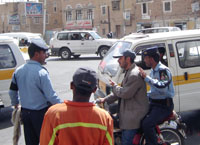
Motorcyclists deal with oppression [Archives:2006/937/Reportage]
April 13 2006
 |
[email protected]
Nearly a year ago, outraged by the government's unjust decree against them, motorcyclists held dozens of demonstrations throughout Sana'a. The government cut their only source of income when it banned motorcyclists from driving in the capital. The cyclists demanded the government respect their rights and treat them justly.
Following these incidents, motorcyclists slaughtered a bull at the Yemeni Parliament gates, hoping that members would show respect for their rights and ban what was issued previously. After intensive dialogue, the government made it law that all motorcyclists must wear safety helmets while driving to insure the safety of all drivers. Authorities were forced to take a more lenient stance toward them.
Unfortunately, since the ban's decree, police forces have been seen confiscating motorcycles from drivers for the simplest mistake. Even with most cyclists wearing safety helmets, pressure and injustice still is witnessed against them, as the government violates international laws. According to local motorcyclists, fines for simple violations reach up to four times the amount of their daily incomes.
Motorcyclists feel that the only obstacle standing in their way toward a decent life is their own government. “Where in the world does a government harm its people more than it helps them?” asked Ibb native Sultan Ali, who has been depending on his motorcycle to feed his family. “What do they want us to do – rob and steal from stores and houses in order to live?” he added.
Authorities claim motorcyclists spread chaos throughout the capital city with their unorganized driving and are at great health risk due to the lack of possessing necessary equipment for driving. “They cause us more trouble than taxi and bus drivers put together. When they have a violation, they don't give it any importance,” said Abdullah Nasser, a traffic police officer in the Hasaba zone of Sana'a. “Many of them don't even have a license plate on the rear of their motorcycles, as if the law does not exist,” he added.
Such circumstances arise as poverty quickly spreads in Yemen, with nearly 40 percent of citizens living near the poverty line, while 17 percent already live below it, according to the United Nations annual report. Yemeni unemployment is higher than ever, with those occupying jobs working for an average equivalent of $3 a day. In a survey taken among dozens of Sana'a motorcyclists, 85 percent put their average daily income between YR 600-1,200 ($3-6).
Saleh Salem complained of harsh procedures by traffic police toward him and other motorcyclists. According to Salem, police make up violations simply to blackmail cyclists and put them in a position where there is no other option but to bribe them.
“I only make YR 700 ($4) in a hard workday and these government thieves want to take what little we possess,” said the 46-year-old motorcyclist, who encounters several difficulties in trying to work to meet his family's needs. “If all we possessed was basic life essentials, they still would try to take from us,” he added.
It is widely known that Yemeni police forces await any opportunity to hunt for 'prey' that might violate any law. This is considered a positive thing in most countries around the world, but in Yemen, laws are abused by government employees ranging from top officials to regular security guards. Fines and huge violations are given to the weak, not the strong, resulting in an undemocratic way of life.
From citizens' point of view, such regulations against motorcyclists – who are not looking to get rich but only earn enough to live – are unacceptable and outrageous. “These economic sanctions our government is practicing upon cyclists are practiced throughout the country and at different levels,” said Jarullah Abdul Jabbar, a local resident who cleans the shoes of passersby for a living. “Even those selling potatoes or the simplest kind of materials are being stopped from doing so. How do they expect us to live?” he asked.
The situation seems to be worsening nowadays, as traffic police also face poor economic situations and therefore, look for any violation by bus drivers, taxis and motorcyclist. “If we count on the government's income for a living, we all will live on the streets. Government officials working above us give us permission to take from violators and met our needs, as long as they get their share,” said a traffic police officer wishing to remain anonymous. “We all suffer in this country, not only motorcyclists,” he concluded as he walked back to his post on one of the street corners of Sana'a.
——
[archive-e:937-v:14-y:2006-d:2006-04-13-p:report]


